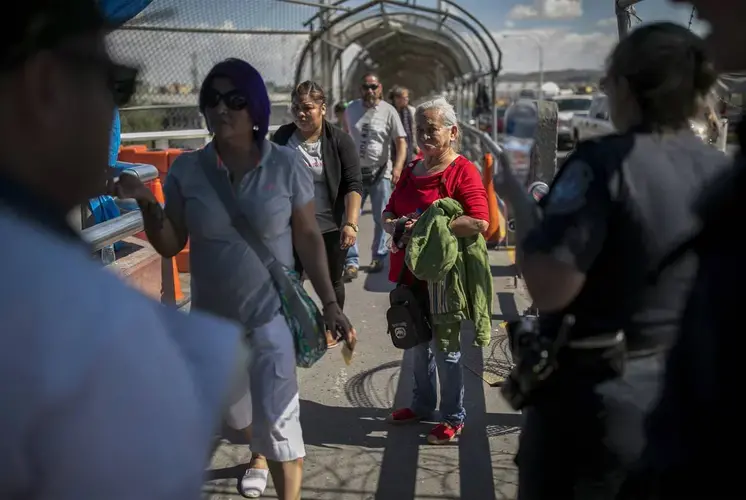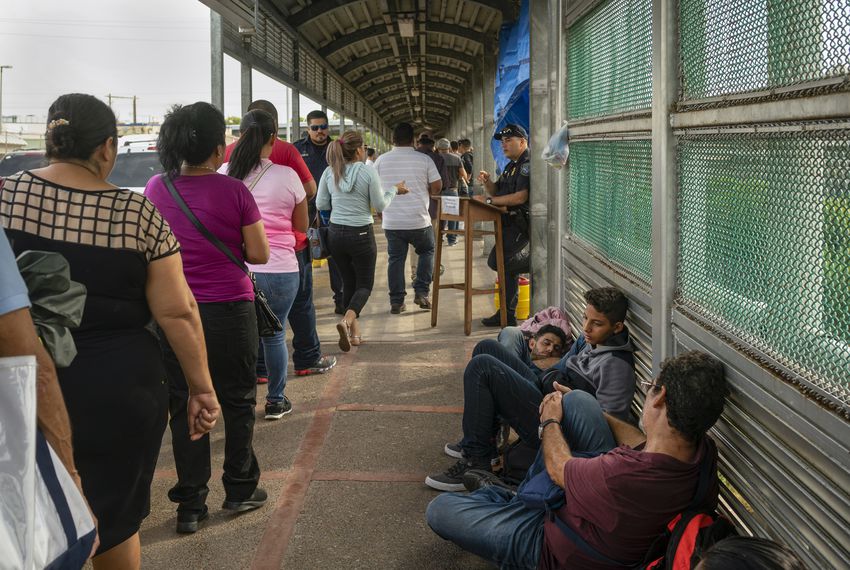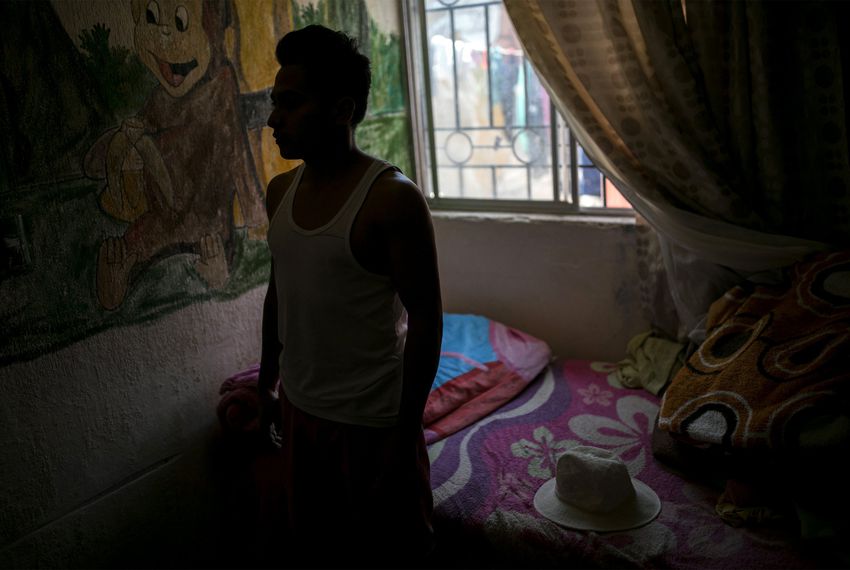
CIUDAD JUAREZ, MEXICO—As the highway stretches farther away from the United States, the vast Chihuahuan desert appears to swallow the outskirts of this border city. In one of the sparse neighborhoods built to house workers from the city’s massive factories, known as maquilas in Spanish, mangy dogs scoured for food around houses marred by broken windows and graffiti—and Oscar, a migrant from Honduras, recounted the second-worst beating of his life.
“When I was going to apply for asylum [last month], they beat me up,” the 30-year-old Honduran said from a two-bedroom house where as many as eight people live. Oscar, who asked that his last name not be revealed, said the attackers asked if he was from Honduras, and when he said yes, they pounced. He showed scars on his forehead where his face was cracked open and lifted his lip to show where most of his teeth had been before the assault.
Oscar said he fled Honduras with his wife and three children because of something even worse. He lifted his shirt to show the scars from more than a dozen staples he needed after he was shot by gang members in his home country and nearly killed. The family arrived a few months ago and now lives in a small house owned by the son of a sympathetic Ciudad Juárez resident who is also risking her safety by sheltering as many migrants as she can.
“I’m scared to go to work,” he added. But he still goes to his job at a nearby construction site, where he gets paid under the table.
What happened to Oscar is becoming more common since the surge of Central American and Cuban migrants began arriving in this city a few years ago, immigration attorneys and advocates say. But they contend that the problem has become worse since the Trump administration implemented two policies that force asylum seekers to spend months in Mexican border cities like Ciudad Juárez.
Under the administration’s “metering” policy, migrants are forced to wait for months before they are allowed to apply for asylum in the United States. That was followed earlier this year in Texas by the Migrant Protection Protocols, known as “remain in Mexico,” which requires asylum seekers to wait in Mexico for their court hearings. More than 10,000 asylum seekers have been sent back to Ciudad Juárez under the program, and thousands more have sheltered in the city as they wait their turn to request asylum.
In interviews with journalists and human rights advocates, and in sworn testimony in immigration proceedings, asylum seekers have described how they have been extorted, assaulted and raped by criminals after being returned to Mexico.
Since the beating, Oscar said, he has yet to apply for asylum; he is weighing his options as he and his family lie low on the outskirts of Ciudad Juárez. And they might not have a roof over their heads if not for a loose network of Hondurans who quietly offer one another aid and shelter.
The house belongs to the son of a Mexican citizen named Elena; she lives across the street with her Honduran husband. Her son, who is away in southern Mexico, asked his mother to rent out his property. But Elena decided to offer it as a safe haven to some of her husband’s countrymen.
“I do it because it makes me sad to see so many people in the streets,” she said. “They have kids and they don’t have enough to eat.”
Elena is also helping a 24-year-old Honduran named Alexander, who applied for asylum in early June after he crossed the Rio Grande into El Paso. Alexander, who asked that his last name not be revealed because he fears retaliation in Mexico, said he was detained for 18 days and at one point asked to be sent back to Honduras rather than remain in detention indefinitely.
“They said, ‘You’re here, no one invited you, so wait for what’s coming.’ And that’s when they sent us back to Ciudad Juárez.”
Like thousands of others, Alexander said he fled north because of the violence in Honduras, where police are unwilling or unable to help fight the gangs that have terrorized the Central American country.
“They killed my aunt, and I don’t know where a lot of my family members are,” he said. So he made his way across Guatemala and Mexico and crossed the river alone.
He has legal permission to stay in Mexico after he was given a temporary visa. But the visa doesn’t allow him to legally work, he said, and he’s been turned down repeatedly when he tried to find a job at nearby factories.
“I’ve tried to get papers, but I don’t have the right ones,” he said.
Under pressure from the Trump administration to shelter more Central American migrants, the Mexican government has awarded work visas to some migrants waiting for their court dates in the United States. Enrique Valenzuela, the director of Ciudad Juárez’s Centro de Atención a Migrantes, a migrant transition facility operated by the Chihuahua state government, told The Texas Tribune last week that his office is trying to help more migrants apply for the visas. But Alexander said he wasn’t aware that the agency could help him — and after what happened to Oscar, he said he’s hesitant to leave the safety of Elena’s house, which is guarded by the couple’s two dogs.
“It’s dangerous here; you can’t leave,” he said. “I just stay here.”
Elena knows the danger the migrants face. Five years ago, when the migrant surge began in earnest, she said, municipal police officers broke into her home and accused her and her husband of trafficking and illegally harboring migrants. Then they attacked her husband even though she said there were no migrants in her house when the police arrived.
“They beat him up, they put a bag over his face and they tried to make him say that he’s from Honduras and he had fake papers,” she said. “That’s why I’m scared. A neighbor, I don’t know who, said that a lot of Hondurans lived here. I am scared because I’m afraid they’ll accuse me of being a [smuggler].”
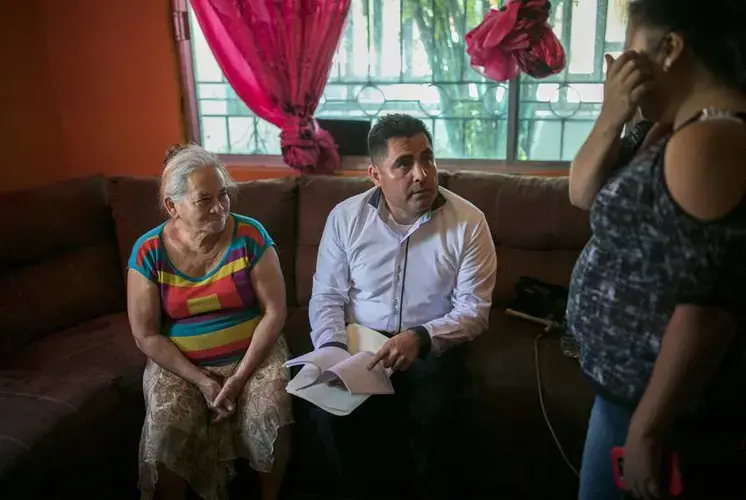
On Friday, Elena made the drive to downtown Juárez with another Honduran migrant she's sheltered for several months, 64-year-old Bertha Arias.
Arias applied for asylum in the United States with her granddaughter in November 2016 after the 15-year-old was told by members of the notorious MS-13 gang that she had to marry a gang member, said her El Paso-based attorney, Eduardo Beckett. When Arias and her granddaughter arrived at the border, Beckett said, the teen was placed with her mother, who lived in Houston, while Arias was sent to a processing center in El Paso, where she spent 19 months waiting for her asylum claim to be heard.
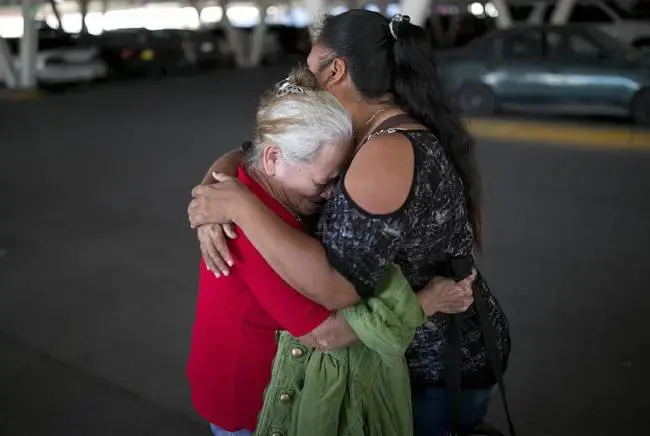
A U.S. immigration judge denied Arias' claim, and she was deported back to Honduras, where she faced more death threats from the gang, Beckett said. She again fled to Mexico and was able to get in touch with Elena's husband, who took her in. Now she's living in the shadows until the U.S. 5th Circuit Court of Appeals rules on her appeal of the asylum denial.
In what he knew was a long shot, Beckett convinced Arias to try crossing the international bridge with him Friday so he could ask U.S. Customs and Border Protection officials to grant her an interview with asylum officers. Beckett said he hoped U.S. officials would let her stay in Texas while the appeal was being decided.
Arias agreed, and as she left Elena’s house, Oscar's young children peered through the windows of the house across the street. During the 30-minute drive to downtown Ciudad Juárez, Bertha was quiet, and Beckett told stories about other clients to break the tension.
When they arrived at a parking garage, Elena and Arias embraced and cried before Arias walked with the lawyer to the bridge. Beckett showed a CBP officer stationed in the middle of the international bridge his client’s documents. Another officer listened attentively to Beckett's plea, then called in the request to his supervisors. He offered Arias and Beckett bottles of water as they waited in the triple-digit heat.
But in the end, Arias was sent back to Ciudad Juárez and told to wait.
“I feel like I let her down. I could have tried harder,” Beckett said as he walked toward the U.S. side of the bridge. “But if something happens to her, they’re going to have blood on their hands.”
